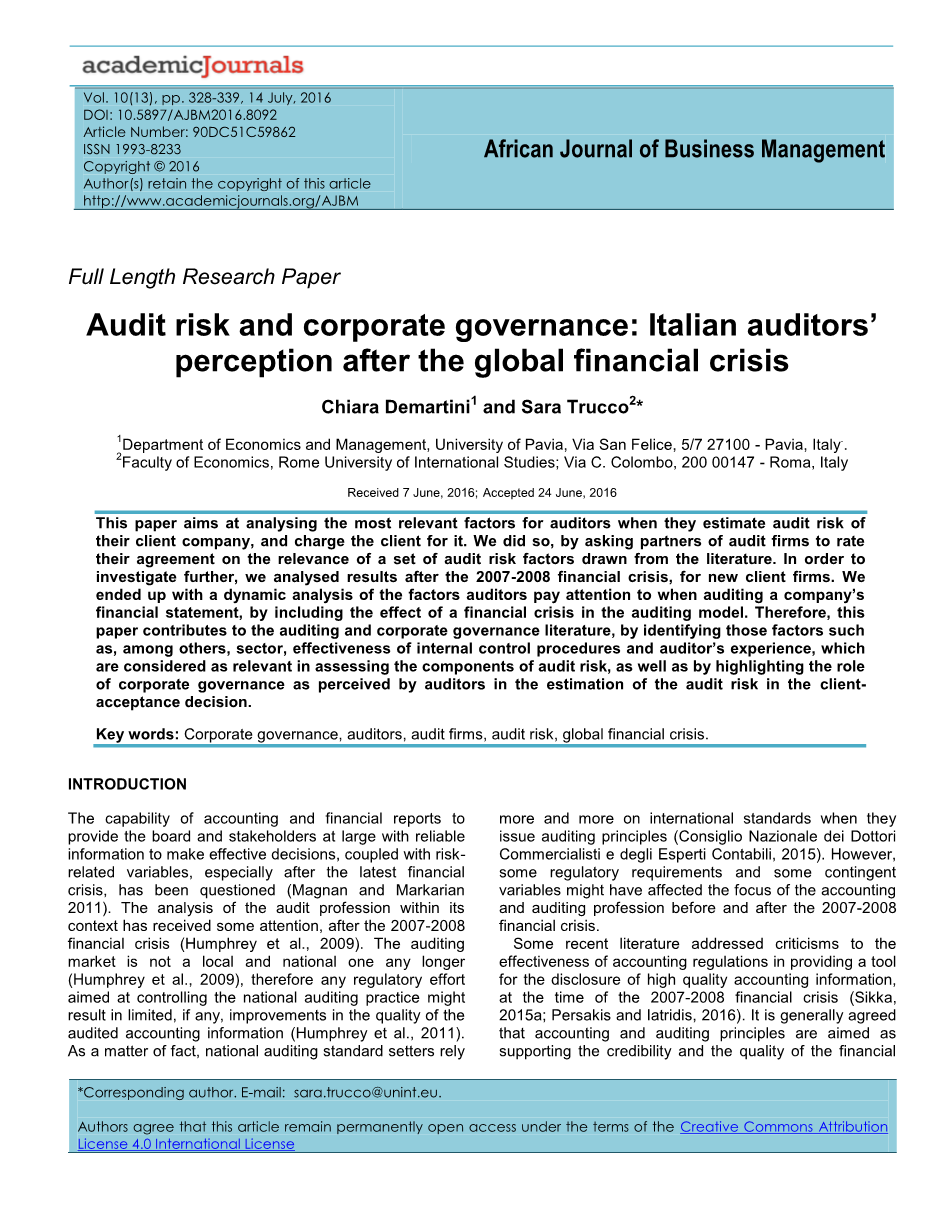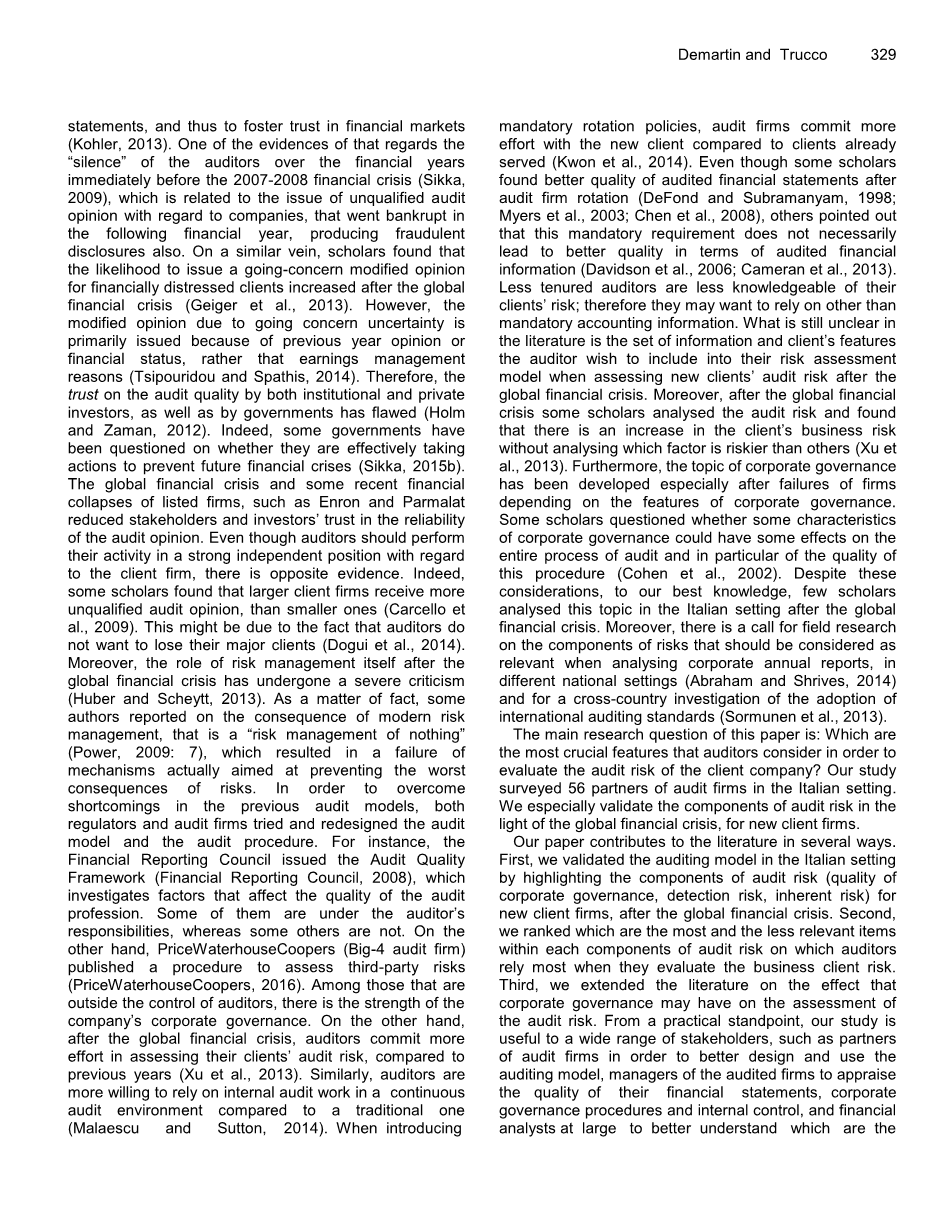

英语原文共 12 页
Audit risk and corporate governance: Italian auditorsrsquo; perception after the global financial crisis
Chiara Demartini and Sara Trucco
Abstract
This paper aims at analysing the most relevant factors for auditors when they estimate audit risk of their client company, and charge the client for it. We did so, by asking partners of audit firms to rate their agreement on the relevance of a set of audit risk factors drawn from the literature. In order to investigate further, we analysed results after the 2007-2008 financial crisis, for new client firms. We ended up with a dynamic analysis of the factors auditors pay attention to when auditing a companyrsquo;s financial statement, by including the effect of a financial crisis in the auditing model. Therefore, this paper contributes to the auditing and corporate governance literature, by identifying those factors such as, among others, sector, effectiveness of internal control procedures and auditorrsquo;s experience, which are considered as relevant in assessing the components of audit risk, as well as by highlighting the role of corporate governance as perceived by auditors in the estimation of the audit risk in the client acceptance decision.
Key words: Corporate governance, auditors, audit firms, audit risk, global financial crisis
Introduction
The capability of accounting and financial reports to provide the board and stakeholders at large with reliable information to make effective decisions, coupled with risk related variables, especially after the latest financial crisis, has been questioned (Magnan and Markarian 2011). The analysis of the audit profession within its context has received some attention, after the 2007-2008 financial crisis (Humphrey et al., 2009). The auditing market is not a local and national one any longer (Humphrey et al., 2009), therefore any regulatory effort aimed at controlling the national auditing practice might result in limited, if any, improvements in the quality of the audited accounting information (Humphrey et al., 2011). As a matter of fact, national auditing standard setters rely more and more on international standards when they issue auditing principles (Consiglio Nazionale dei Dottori Commercialisti e degli Esperti Contabili, 2015). However, some regulatory requirements and some contingent variables might have affected the focus of the accounting and auditing profession before and after the 2007-2008 financial crisis.
Some recent literature addressed criticisms to the effectiveness of accounting regulations in providing a tool for the disclosure of high quality accounting information,at the time of the 2007-2008 financial crisis (Sikka, 2015a; Persakis and Iatridis, 2016). It is generally agreed that accounting and auditing principles are aimed as supporting the credibility and the quality of the financial statements, and thus to foster trust in financial markets (Kohler, 2013). One of the evidences of that regards the“silence” of the auditors over the financial years immediately before the 2007-2008 financial crisis (Sikka, 2009), which is related to the issue of unqualified audit opinion with regard to companies, that went bankrupt in the following financial year, producing fraudulent disclosures also. On a similar vein, scholars found that the likelihood to issue a going-concern modified opinion for financially distressed clients increased after the global financial crisis (Geiger et al., 2013). However, the modified opinion due to going concern uncertainty is primarily issued because of previous year opinion or financial status, rather that earnings management reasons (Tsipouridou and Spathis, 2014). Therefore, the trust on the audit quality by both institutional and private investors, as well as by governments has flawed (Holm and Zaman, 2012). Indeed, some governments have been questioned on whether they are effectively taking actions to prevent future financial crises (Sikka, 2015b). The global financial crisis and some recent financial collapses of listed firms, such as Enron and Parmalat reduced stakeholders and investorsrsquo; trust in the reliability of the audit opinion. Even though auditors should perform their activity in a strong independent position with regard to the client firm, there is opposite evidence. Indeed, some scholars found that larger client firms receive more unqualified audit opinion, than smaller ones (Carcello et al., 2009). This might be due to the fact that auditors do not want to lose their major clients (Dogui et al., 2014). Moreover, the role of risk management itself after the global financial crisis has undergone a severe criticism (Huber and Scheytt, 2013). As a matter of fact, some authors reported on the consequence of modern risk management, that is a “risk management of nothing” (Power, 2009: 7), which resulted in a failure of mechanisms actually aimed at preventing the worst consequences of risks. In order to overcome shortcomings in the previous audit models, both regulators and audit firms tried and redesigned the audit model and the audit procedure. For instance, the Financial Reporting Council issued the Audit Quality Framework (Financial Reporting Council, 2008), which investigates factors that affect the quality of the audit profession. Some of them are under the auditorrsquo;s responsibilities, whereas some others are not. On the other hand, PriceWaterhouseCoopers (Big-4 audit firm) published a procedure to assess third-party risks (PriceWaterhouseCoopers, 2016). Among those that are outside the control of auditors, there is the strength of the companyrsquo;s corporate governance. On the other hand, after the global financial crisis, auditors commit more effort in assessing their clientsrsquo; audit
资料编号:[4482]


